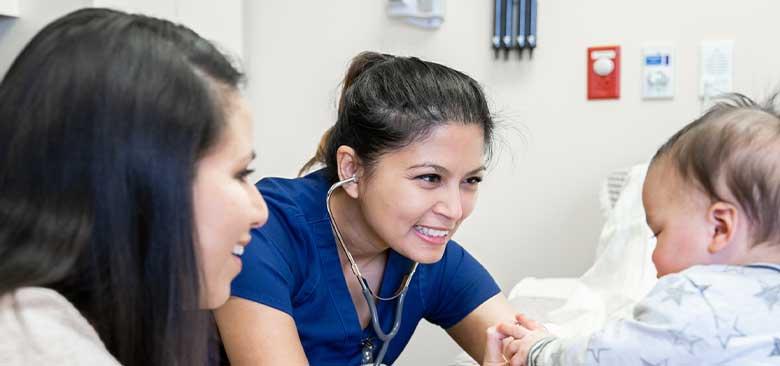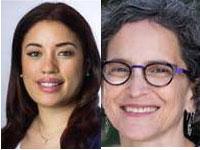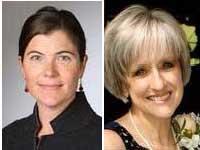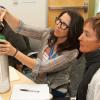
The School of Nursing's Master of Science degree program is providing its students the most advanced content on health equity. (Photo credit: iStock)
Preparing Nurses to Lead in Health Equity
The UCSF School of Nursing is leveraging innovative practices and technological advancements to prepare the next generation of nurse leaders to champion health equity.
Through its Master of Science degree program, the School is working to expand students’ understanding of health inequities, and train them to think critically in developing practical solutions to health disparities for vulnerable communities.
“Many students never thought of themselves as advocates,” said Lisa Mihaly, assistant professor who is co-leading a new health equity course. “It’s important to identify an issue they really care about and collaborate with those in health care to make that change happen.”
In addition, the school has launched a new Post-Master’s Certificate that will double the number of California psychiatric mental health nurse practitioners in five years, especially in underserved communities where the shortage of providers is most critical.
Health Equity in the Curriculum
School leadership, faculty and students are collaborating to ensure students are receiving the most advanced content on health equity.
In 2019, associate professor Kim Dau, working with a group of students, requested that the School’s Master’s Program Council (MPC) examine the socio-cultural graduation requirement. That requirement emphasized the concept of cultural humility, which focuses on speaking humbly and respectfully to those from different cultural backgrounds.
After launching a task force to examine recent studies and consult with faculty, students and an external expert, the MPC modernized the requirement to focus on Structural Competency, which encourages health care professionals “to recognize, analyze and intervene upon the structural factors that impact health disparities.” The new requirement applies to all master’s students starting this fall.
The Family Nurse Practitioner specialty has been teaching a course focused on vulnerable populations for approximately 15 years, and the new Racism, Health Care and Social Justice course, grew out of that work. The FNP faculty are currently working with associate professor Linda Stephan, who chaired the task force, to expand the course to the pediatric NP students, and hope to expand it beyond that in future years.
What’s most gratifying to Stephan is that students initiated the discussion and faculty responded with action.  Linda Stephan
Linda Stephan
“The student voice was a huge part of this, and faculty is listening,” Stephan said.
Racism, Health Care and Social Justice
As part of the School’s efforts to enhance its health equity offerings, assistant professors Jayme Mejia and Lisa Mihaly debuted the course, “Racism, Health Care and Social Justice,” this past academic year.
The course examines structural racism and social determinants of health, and illuminates how historical events have led to disparities for marginalized and underserved populations. It covers racism, environmental justice, homelessness, decolonized approaches to chest/breastfeeding, racism in nursing, working with undocumented individuals, xenophobia, primary care for the incarcerated and reproductive justice. In addition to listening to student input, Mejia and Mihaly consulted with associate professor Kim Dau and assistant professor Ifeyinwa Asiodu, who tackle similar issues in their midwifery course “Racism and Health Disparity Prevention.”
“You can’t talk about providing health care in this country without addressing how racism affects the way we provide health care to our patients,” Mihaly said. “My hope is that everyone takes more classes like this so we can bring awareness to these issues and work to change them.”
The course welcomed about 40 students last winter — primarily those in the Family Nurse Practitioner specialty — and blends lectures, guest speakers and class discussions. Its focus on advocacy instills in students the motivation to make changes.
 Jayme Mejia, Lisa Mihaly “Our goal was to help them understand the structural forces that affect patients and providers, and to understand the ways providers can make a difference,” Mihaly said.
Jayme Mejia, Lisa Mihaly “Our goal was to help them understand the structural forces that affect patients and providers, and to understand the ways providers can make a difference,” Mihaly said.
The course was so well-received that FNP students in the Advocacy, Community Engagement, Quality Improvement, Leadership Academy (ACQILA) concentration are advocating that it be expanded, so all nursing students can take it, Mihaly said. Additionally, Stephan, who teaches in the Pediatric Nurse Practitioner specialty, will join Mejia and Mihaly as co-instructors with hopes of bringing in more students with a pediatric focus.
Similar content had existed in the Family Nurse Practitioner program for over a decade under the “Vulnerable Populations” series. Mejia said those courses shaped her approach to care as an FNP.
“FNP students have been demanding more of this content for a long time,” Mejia said. “It is long overdue to be more intentional in naming structural racism as a root cause of health inequity and moving away from theories and approaches that blame the individual.”
Addressing Disparities in Mental Health Care
Advancing health equity also requires improving access to behavioral health care. Currently, more than half of Californians suffering from mental health issues are not receiving care, according to the California Health Care Foundation (CHCF).
The School is committed to helping solve California’s mental health crisis and has partnered with the nursing schools at UC Davis and UCLA to offer an innovative solution: an online Post-Master’s Certificate that will train 300 new psychiatric mental health nurse practitioners (PMHNPs) by 2025, serving an estimated 378,000 patients.
The one-year online training allows nurse practitioners to continue working in their communities as they pursue their certification. Applicants are recruited from underserved rural and urban areas, so they can better serve their communities upon program completion.
“A primary goal is workforce expansion,” said Co-Director Rosalind De Lisser, associate professor. “Developing this program will allow us to build a pipeline for the  Rosalind De Lisser, Deborah Johnson mental health workforce.”
Rosalind De Lisser, Deborah Johnson mental health workforce.”
Forty students compose the inaugural cohort, which begins January 2021.
“With COVID, providers are in so much transition,” said Co-Director Deborah Johnson, associate professor at the School. “They need a lot of extra support and problem solving. Thinking outside the box is going to be critical to training the next generation of providers.”
The initiative is supported by a $1.4 million grant from CHCF.
Embracing Telehealth
As the COVID-19 pandemic restricted in-person patient access to medical facilities, telehealth has helped bridge the gap between patients and health care providers.
For students, telehealth has enhanced their skill set and added another dimension to their knowledge of health equity. Telehealth allows students to better understand issues their patients experience at home that impact their health.
Havilyn Kern (MS ’20), a psychiatric mental health nurse practitioner who treated patients with anxiety, depression, paranoid schizophrenia and other issues at the Los Gatos Therapy Center, gained new insights from telehealth. For example, during one telehealth session with a couple, she noticed a large collection of items in the background, a possible sign of hoarding.
 Havilyn Kern, Joaleen Johnson “That sparked a new conversation and we were able to make progress,” Kern said.
Havilyn Kern, Joaleen Johnson “That sparked a new conversation and we were able to make progress,” Kern said.
Joaleen Johnson (MS ’19), a psychiatric nurse practitioner at Aldea Children & Family Services in Napa, provides telehealth care to children and teenagers. Some patients feel uncomfortable being seen on camera, so she has learned to adapt to meet their needs: she sometimes begins visits with only herself on camera or uses card games and art exercises to put them at ease.
“Building rapport can take longer and it can be more challenging to incorporate some aspects,” Johnson said. “But I believe [telehealth] is the direction we’re going and I’m really happy with the results.”



